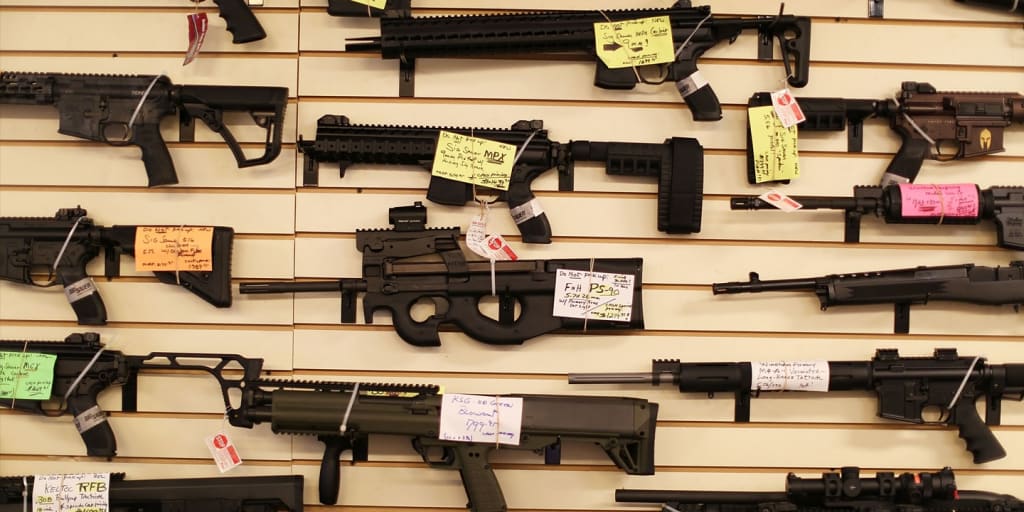The U.S. and Guns
The U.S. has the most gun related deaths in comparison to any other developed country, why?

Unfortunately, one of the biggest problems the United States faces at the moment is the plague of gun violence around the country. According to the CDC, approximately 34,000 people die each year in the U.S. because of firearms. That is a big number when you compare it to the other well developed countries around the world. The United States is the country with the most guns in the world. The U.S. constitution allows its citizens to purchase and own guns, however each state has the right to elaborate around these laws, either making it easier or harder to purchase a gun. There is a positive correlation between the states with the highest gun related deaths and the ease of access to guns in those states.
According to the laws in different states, the access to guns changes. Some states have very relaxed laws on guns and because of that, a bigger part of the population owns them. To determine which states are more strict on gun laws and which aren't, we need to analyze the laws that affect the right to carry, black rifles (assault weapons), the Castle Doctrine, and background checks. The difference in these aspects are what usually separate states on their stance on gun ownership. On the right to carry section, we have states that require a license to purchase a firearm and to carry one. In some states, permits are required for the purchase of a firearm, making it harder to have access to a gun compared to other states. Black rifles, or assault weapons, are restricted in some states. Some require owners to have a certain magazine capacity and register detachable magazines. The Castle Doctrine refers to a state's stance on self-defense. Some states say that an individual has to retreat until he is backed into a corner before he can use deadly force while others, called the "Stand your Ground" states, say that you can use deadly force if you feel that your life is in danger or if you will be seriously injured. The last major aspect between states regarding gun laws is the background check. All states require a licensed dealer to run a state sponsored background check before he can sell a gun to an individual. There is, however, what people call the "gun show loophole" where no background check is needed in a private sale. Some states address this problem by having even private sellers contact local authorities to run background checks before a weapon can be sold. The application of these laws are what separate states with weak gun laws from states with strong gun laws.
According to the laws previously mentioned, Guns and Ammo did a research on the top ten best states for gun owners, which are: Arizona, Vermont, Alaska, Utah, Kentucky, Wyoming, Alabama, Kansas, Missouri, and New Hampshire. These states are more relaxed regarding gun control. Most of them have a big gun culture, especially because lots of them have good hunting locations, and these cultures affect their laws on gun control. The same way we have states with weak gun laws, we also have states with strong gun laws which make owning a gun much more difficult. The top ten hardest states to own a gun, according to the same source, are: California, Connecticut, Delaware, Hawaii, Illinois, Maryland, Massachusetts, New Jersey, New York, and Rhode Island. The implementation of different laws presented in the previous paragraph is what makes these states so hard to own a gun.
The ease of access to guns in some states make them have a higher number of them. Unfortunately, the only data we have about the amount of guns per capita in each of the U.S. states comes from the ATF's National Firearms Registration and U.S. Census. According to CBS News, this list only includes: "Machine guns, short-barreled rifles, short-barreled shotguns, suppressors, destructive devices like bombs and grenades, concealable devices with the ability to discharge a shot through the energy of an explosive, and any firearm with a bore over half an inch that has not been determined to have a legitimate sporting use." The data we have doesn't include handguns. Therefore, the actual number of guns owned per capita will be much higher than the ones in registration. Using the limited list from the ATF's National Firearms Registration, we see that out of the best states for gun owners, three of them are among the states with the highest amount of guns per capita: Alabama with 20 for every 1,000 people, Alaska with 15.2 for every 1,000 people, and Wyoming with 195.7 for every 1,000 people. The other states on the list aren't that far behind either as they are among the top half. The gun laws in these states are most likely a key factor to the high number of guns they possess. Out of the states with stronger gun laws, six of them are in the top ten states with the least gun ownership in the U.S. These states are: New York with 3.3 per 1,000 people, Rhode Island with 3.8 per 1,000, Delaware with 4.2 per 1,000 people, Massachusetts with 4.9 per 1,000 people, New Jersey with 5.8 per 1,000 people, and Hawaii with 5.1 per 1,000 people. The small amount of guns in these states, compared to others, is most likely connected to the strong gun laws they have.
The U.S. has one of the highest gun related death rates in the world and some states have higher rates than others. Politics That Work did a research on the states with the highest and lowest gun related deaths. The number that will be displayed for each state are for every 100,000 people. Starting with the top ten highest rates, we have: Alaska with 20.4, Louisiana with 19.2, Alabama with 16.2, Mississippi with 16.1, Wyoming with 15.6, Montana with 15.4, New Mexico with 14.9, Arizona with 14.6, Nevada with 14.5, and Arkansas with 14.4. In comparison we have the top ten states with the lowest rates which are: Hawaii with 3.2, Massachusetts with 4.1, Rhode Island with 4.6, New York with 5.1, New Jersey with 5.2, Connecticut with 5.9, Iowa with 6.8, Minnesota with 6.8, California with 7.7, and Maine with 7.9. When we compare this data with research done by Guns & Ammo for the best states for gun owners, we see an interesting correlation. Out of the ten states with the highest gun related deaths, four of them are in the top ten best states for gun owners and 7 of them are in the top twenty. When we look at the states with strong gun laws, we see that eight out of ten of them are in the top ten states with the fewest gun related death rates. With that information, we can predict that states with strong gun laws will have a lower death rate when talking about gun violence.
You just saw the states that have the highest and lowest gun related death rates in the U.S. and the amount of guns in each of those states could have something to do with it. From the ten states with the highest gun death rates, seven of them are among the top ten states with most guns per capita. The same can be said about the opposite as the same research shows that seven out of the top ten states with the fewest gun deaths are among the top ten states with the fewest guns per capita. This data adds to the idea that there is a correlation between gun deaths and gun access in U.S. states.
The U.S. has one of the highest gun related death rates between developed countries around the world, but this can be changed. There is a positive correlation between the states with the highest gun related deaths and the ease of access to guns in those states. Using this information, we can predict that lowering the amount of guns in circulation will also lower the amount of deaths related to guns. We are a first world country with a great economy, excellent lifestyle, and great people. Our safety regarding guns is just as important and we should do all we can for it to reach the same outstanding standards as our other positive qualities.
About the Creator
Tiago Souza
Just a regular guy getting through the college life.






Comments
There are no comments for this story
Be the first to respond and start the conversation.